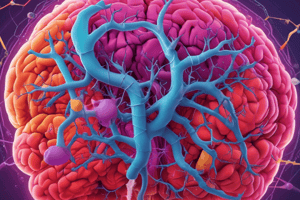Podcast
Questions and Answers
What type of drug is ketamine?
What type of drug is ketamine?
- Stimulant
- Hallucinogen (correct)
- Depressant
- Opioid
In what setting is ketamine sometimes used for medical purposes?
In what setting is ketamine sometimes used for medical purposes?
- Pain relief
- Anesthesia (correct)
- Blood pressure regulation
- Antibiotic treatment
What are some potential short-term effects of ketamine use?
What are some potential short-term effects of ketamine use?
- Hallucinations and numbness (correct)
- Increased heart rate and energy
- Euphoria and relaxation
- Decreased blood pressure and respiratory depression
Which nucleus produces noradrenaline (norA) in the medulla and pons?
Which nucleus produces noradrenaline (norA) in the medulla and pons?
During which state is the locus coeruleus (LC) silent?
During which state is the locus coeruleus (LC) silent?
Which receptor type is α2 coupled to?
Which receptor type is α2 coupled to?
What is the mechanism of action of Bupropion (Zyban)?
What is the mechanism of action of Bupropion (Zyban)?
What is the recommended washout period for most MAOI drugs?
What is the recommended washout period for most MAOI drugs?
What is the suggested mechanism for the slow onset of antidepressant effects despite rapid changes in monoamine response?
What is the suggested mechanism for the slow onset of antidepressant effects despite rapid changes in monoamine response?
What is the primary clinical use of Ketamine?
What is the primary clinical use of Ketamine?
What is the primary target for electrical stimulation in non-responsive patients?
What is the primary target for electrical stimulation in non-responsive patients?
What is the primary recommended therapy for mild depression?
What is the primary recommended therapy for mild depression?
What percentage of Australians take antidepressants?
What percentage of Australians take antidepressants?
What is the suggested reason for the limited understanding of the adaptive changes to antidepressant drugs?
What is the suggested reason for the limited understanding of the adaptive changes to antidepressant drugs?
Which neurotransmitters are targeted by antidepressant drugs?
Which neurotransmitters are targeted by antidepressant drugs?
Why are monoamine oxidase inhibitors (MAOIs) not widely used?
Why are monoamine oxidase inhibitors (MAOIs) not widely used?
What is a challenge to the simple monoamine deficit theory of depression?
What is a challenge to the simple monoamine deficit theory of depression?
Which antidepressant drug class claims better efficacy and fewer side effects than SSRIs?
Which antidepressant drug class claims better efficacy and fewer side effects than SSRIs?
What is the lifetime prevalence of depression in the population?
What is the lifetime prevalence of depression in the population?
What is the potential consequence of a deficit in monoamines in the brain?
What is the potential consequence of a deficit in monoamines in the brain?
Which antidepressant drug class has problematic side effects including anti-muscarinic effects and potential for drug interactions?
Which antidepressant drug class has problematic side effects including anti-muscarinic effects and potential for drug interactions?
What is a limitation in the understanding of the pathophysiology of depression and how antidepressant drugs alter it over time?
What is a limitation in the understanding of the pathophysiology of depression and how antidepressant drugs alter it over time?
Which neurotransmitter is not targeted by antidepressant drugs?
Which neurotransmitter is not targeted by antidepressant drugs?
What is a potential consequence of a deficit in serotonin in the brain?
What is a potential consequence of a deficit in serotonin in the brain?
What is a common side effect associated with selective serotonin reuptake inhibitors (SSRIs)?
What is a common side effect associated with selective serotonin reuptake inhibitors (SSRIs)?
What is a potential consequence of a deficit in norepinephrine in the brain?
What is a potential consequence of a deficit in norepinephrine in the brain?
Flashcards are hidden until you start studying
Study Notes
Understanding Depression and Antidepressant Medications
- Depression can manifest as sadness, irritability, and loss of interest in usual activities, with varying severity and potential for suicidal thoughts or actions.
- Approximately 6% of the population experiences depression at any given time, with a lifetime prevalence of up to 12-15%.
- The monoamine theory of depression, proposed in the 1960s, suggests that a functional deficit in monoamines in the brain leads to depression, influencing the development of antidepressant drugs.
- The clinical effectiveness of antidepressant drugs, such as those affecting serotonin (5HT), norepinephrine (NorA), and dopamine, indicates the importance of these neurotransmitters in depression.
- However, the simple monoamine deficit theory faces challenges, as drugs causing changes in monoamine levels within minutes do not produce antidepressant effects for 4-6 weeks.
- Lack of good animal models of depression limits the understanding of the pathophysiology and how antidepressant drugs alter it over time.
- Antidepressant drug classes include tricyclic antidepressants (TCAs), selective serotonin reuptake inhibitors (SSRIs), 5HT/NorA uptake inhibitors (SNRIs), and monoamine oxidase inhibitors (MAOIs).
- TCAs, such as amitriptyline and nortriptyline, can have problematic side effects, including anti-muscarinic effects and potential for drug interactions.
- SSRIs, like fluoxetine and citalopram, are commonly prescribed and generally have fewer problematic side effects compared to TCAs or MAOIs.
- SNRIs, exemplified by venlafaxine, claim better efficacy and fewer side effects than SSRIs, but evidence for this is unclear.
- MAOIs, while some of the oldest antidepressants, are not widely used due to side effects and interactions, including the "cheese reaction" caused by increased tyramine levels.
- Understanding the potential side effects, interactions, and time required for antidepressant effects is crucial for effective treatment of depression.
Studying That Suits You
Use AI to generate personalized quizzes and flashcards to suit your learning preferences.




